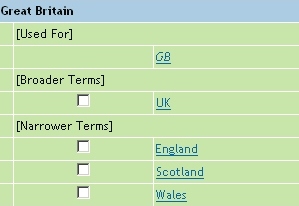Many subject specific databases make use of a thesaurus, which is a standardized list of keywords, subject headings or descriptors. Thesaurus terms are carefully chosen by the producers of a database and are added to records (by subject specialists) to describe the content or subject of publications.
A thesaurus typically has a hierarchical tree structure in which general topics branch off to terms with narrower meanings. For each term, the thesaurus contains the narrower, broader, related, and equivalent terms, as well as a scope note.
The figure shows the geographical name Great Britain as an example. In the CAB thesaurus, it has a broader, less specific term (UK) and three narrower, more specific terms (England, Wales and Scotland). This term has no related terms. The scope note is "Used for: GB", which is a synonym of Great Britain. In a scope note, you might also find an explanation or definition of the term. If you are interested in information on Great Britain, you probably also want to find information on England, Scotland or Wales. In this case, you can use the explode function, which means that the thesaurus term (Great Britain) and its narrower terms are found in one search.

Example of a thesaurus term and its relations from the thesaurus of CAB Abstracts in the OvidSP search system

Example of a thesaurus term and its relations from the thesaurus of CAB Abstracts in the EBSCOhost search system